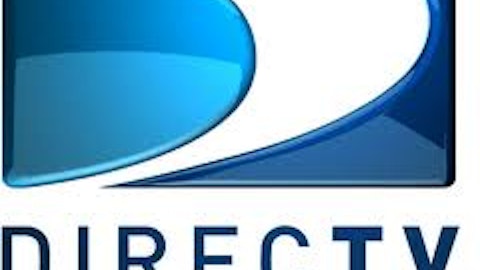Hulu, the video streaming website, is in the news again, putting itself on the auction block. Two of the earliest bidders were DIRECTV (NASDAQ:DTV) and Time Warner Cable Inc (NYSE:TWC). These pay-TV companies are struggling to keep television subscribers as more households turn to online content for entertainment.

Time Warner Cable: an independent thinker
For a long time, Time Warner Cable Inc (NYSE:TWC) operated under the big media conglomerate Time Warner, which owns television stations such as TNT, TBS, and HBO, as well as Warner Bros. films. As such, the bundle was a very integral part of its cable business.
The company was spun off in 2009, and is now an independent concern. CEO Glenn Britt has publicly stated that he thinks “the structure [of pay-TV] needs more flexibility.” Large programming packages disenfranchise many households who can’t afford $100 monthly cable bills, and sends them and others looking for less expensive options. It’s no secret the company is losing subscribers. The company lost 119,000 video subscribers in the first quarter of 2013.
Hulu can help Time Warner Cable Inc (NYSE:TWC) offer that flexibility, and make the company more consumer-friendly. By offering free Hulu Plus access with its internet service or a moderate cable package, it can provide customers with an excellent television watching alternative. It could feasibly use its set-top boxes to give subscribers access to the service right on their television sets, making the experience nearly seamless.
TV Everywhere
Most cable and satellite providers offer some form of TV Everywhere service. Unfortunately, many consumers are simply unaware the service exists.
DISH Network Corp. (NASDAQ:DISH) has done an excellent job promoting its TV Everywhere service with its set-top Hopper box. The service has made it one of the few pay-TV providers to actually grow its subscriber count, adding 36,000 net new subscribers in the first quarter. Still, that compares poorly to the same period in 2012, when the company netted an additional 104,000 subscribers. Dish Network blames the slower growth on a higher churn rate caused by increased package prices.
DIRECTV (NASDAQ:DTV) is Dish Networks’ main competition, and is growing more slowly in the United States. The company added 21,000 net new subscribers in the first quarter, and suffered a 1.45% churn rate. Its TV Everywhere service is not as heavily advertised or as well known as Dish’s, and Hulu could put a well-known brand behind the pay-TV provider’s service.
Time Warner Cable Inc (NYSE:TWC) only started delivering on the vision of TV Everywhere in mid-April. The company launched content access on the iPad and iPhone, and opened up access to over 100,000 WiFi hot-spots across the nation to its cable subscribers. The latter is an important aspect of TV Everywhere service, as phone companies generally put a cap on the amount of mobile bandwidth subscribers can use.
With its plans only getting started, Time Warner Cable Inc (NYSE:TWC) could get a huge marketing boost from offering its service through Hulu. With more than 3 million paid subscribers, and millions more watching content for free, the platform is ubiquitous, with more people watching TV through internet-connected devices.
The most to lose
Unlike Time Warner Cable and other cable providers, DIRECTV (NASDAQ:DTV) doesn’t offer internet service. As more consumers elect to only subscribe to high-speed internet and watch content online, DirectTV is missing out on the growing portion of the market.
Owning Hulu would give the company a foot in the water of a growing industry, and directly make up for lost revenue from slowing video subscriber growth. Last year, Hulu grew its revenue 65% to $695 million. Comparatively, DIRECTV (NASDAQ:DTV)’s revenue growth slowed from 13% in 2011 to 9.2% last year adding just $2.5 million to the top line.
The other bidders
Yahoo!, too, has thrown its hat in the ring, offering $600 million to $800 million for the website and certain content rights. After spending $1.1 billion of cash on Tumblr, it’s not out of the question for Yahoo to eventually offer more than $1 billion for Hulu as well.
With just over $3 billion in cash and short-term investments at the end of last quarter, and having spent $1.1 billion on Tumblr, the company would likely need to finance another billion-dollar-plus acquisition with debt. With just $121 million in debt on the balance sheet, the company can certainly afford to do so. By comparison, both Time Warner Cable and DirectTV have significant amounts of debt, but as companies with regularly recurring revenue streams, they are able to easily manage it.
Other bids have come from private equity groups KKR, Guggenheim Digital, and Silverlake Partners. The Chernin Group reportedly put in a bid in the $500 million range. Interestingly, the company’s founder and CEO Peter Chernin – a longtime media executive – was previously critical of Hulu. Having worked at Fox during the Hulu’s early years, he should have excellent knowledge about the company, and how much it’s worth.
Who wants it more
While Time Warner Cable or DirectTV may not have the best balance sheets or financials to acquire a new business, it’s precisely that reason that they are most desperate to acquire Hulu. That’s why I expect one or the other to significantly outbid Yahoo! and the private equity firms as the bidding wars heat up.
DIRECTV (NASDAQ:DTV), in particular, could use Hulu the most as it currently doesn’t have any internet-related business. Time Warner Cable is somewhat insulated by its diversification with its excellent internet subscription growth. While DirectTV is seeing its Latin American business boom, its growth in the U.S. appears nearly saturated. Hulu is part of the problem, and snatching it up could be part of the solution.
The article Who Wants Hulu More? originally appeared on Fool.com and is written by Adam Levy.
Adam is a member of The Motley Fool Blog Network — entries represent the personal opinion of the blogger and are not formally edited.
Copyright © 1995 – 2013 The Motley Fool, LLC. All rights reserved. The Motley Fool has a disclosure policy.

